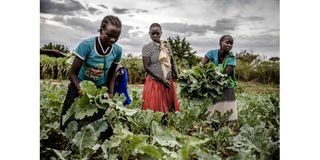Use local language to educate women on climate change

Agro-pastoralist women in Amudat, Uganda near the Kenyan border. Feminists have called for the use of language that women can easily understand. For example, what climate change is in their own language.
What you need to know:
- Women have been challenged to lead in agitating for change in the way governments are strategizing to keep global warming emissions below 1.5℃.
- Unless women are skilled on modern farming methods, they will continue to utilise traditional farming practices, producing harmful agricultural emissions contributing to global warming.
Women should be enabled to actively participate in mitigating climate change to avert future crises, which widen inequalities, feminists said on Sunday.
During a webinar on Integrating Gender Justice in Climate Action: Challenges, Lessons and Way Forward by Akina Mama wa Africa, gender equality advocate Mildred Ngesa challenged women to lead in agitating for change in the way governments are strategizing to keep global warming emissions below 1.5℃.
"Let us empower our people using our own African approaches. Let us educate them on climate change in their own local languages. That way, they can identify the impacts of climate change and take part in mitigating them," she said.
In emphasis, Climate Action Network Arab World board member, Essia Guezzi said the scientific terms on climate change should be translated to local dialect for ease of understanding.
"Use language that women can easily understand. For example, what's climate change in their own language?" she asked.
She said unless women are skilled on modern farming methods, they will continue to utilise traditional farming practices, producing harmful agricultural emissions contributing to global warming.
Poor nations
She called for more involvement of women at the local climate change mitigation programs like construction of dams.
The feminists urged world leaders meeting in November in Glasgow, Scotland for the 2021 United Nations Climate Change Conference to listen to the African women and take action on their demands.
"In the Global South we will say something and people are like (we are) second guessing. (They ask) do we have ulterior motives? Do we really understand the problem?” said independent policy and advocacy strategy advisor, Nancy Kachingwe.
They called on African countries to hold the development nations accountable for polluting the world, the effects of which are much felt by poor nations.
"It is no longer enough to talk about bringing women to the table as being sufficient for gender responsive climate action, we must also begin to reform the system that has continued to protect polluters and those involved in environmental degradation," noted Faith Lumonya, one of the participants.





